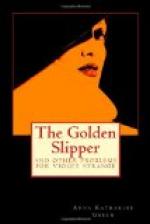“And it is. That’s the old Shaffer homestead. It’s been empty for a year.”
“Oh, empty!” And she turned away, with the most inconsequent air in the world, crying out as her name rang up the stair, “There’s Arthur calling. I suppose he thinks I’ve been here long enough. I’m sure I’m very much obliged to you, officer. I really shouldn’t have slept a wink to-night, if I hadn’t been given a peep at these rooms, which I had imagined so different.” And with one additional glance over her shoulder, that seemed to penetrate both windows and the desolate space beyond, she ran quickly out and down in response to her brother’s reiterated call.
“Drive quickly!—as quickly as the law allows, to Hiram Brown’s office in Duane Street.”
Arrived at the address named, she went in alone to see Mr. Brown. He was her father’s lawyer and a family friend.
Hardly waiting for his affectionate greeting, she cried out quickly. “Tell me how I can learn anything about the old Shaffer house in Seventeenth Street. Now, don’t look so surprised. I have very good reasons for my request and—and—I’m in an awful hurry.”
“But—”
“I know, I know; there’s been a dreadful tragedy next door to it; but it’s about the Shaffer house itself I want some information. Has it an agent, a—”
“Of course it has an agent, and here is his name.”
Mr. Brown presented her with a card on which he had hastily written both name and address.
She thanked him, dropped him a mocking curtsey full of charm, whispered “Don’t tell father,” and was gone.
Her manner to the man she next interviewed was very different. As soon as she saw him she subsided into her usual society manner. With just a touch of the conceit of the successful debutante, she announced herself as Miss Strange of Seventy-second Street. Her business with him was in regard to the possible renting of the Shaffer house. She had an old lady friend who was desirous of living downtown.
In passing through Seventeenth Street, she had noticed that the old Shaffer house was standing empty and had been immediately struck with the advantages it possessed for her elderly friend’s occupancy. Could it be that the house was for rent? There was no sign on it to that effect, but—etc.
His answer left her nothing to hope for.
“It is going to be torn down,” he said.
“Oh, what a pity!” she exclaimed. “Real colonial, isn’t it! I wish I could see the rooms inside before it is disturbed. Such doors and such dear old-fashioned mantelpieces as it must have! I just dote on the Colonial. It brings up such pictures of the old days; weddings, you know, and parties;—all so different from ours and so much more interesting.”
Is it the chance shot that tells? Sometimes. Violet had no especial intention in what she said save as a prelude to a pending request, but nothing could have served her purpose better than that one word, wedding. The agent laughed and giving her his first indulgent look, remarked genially:




